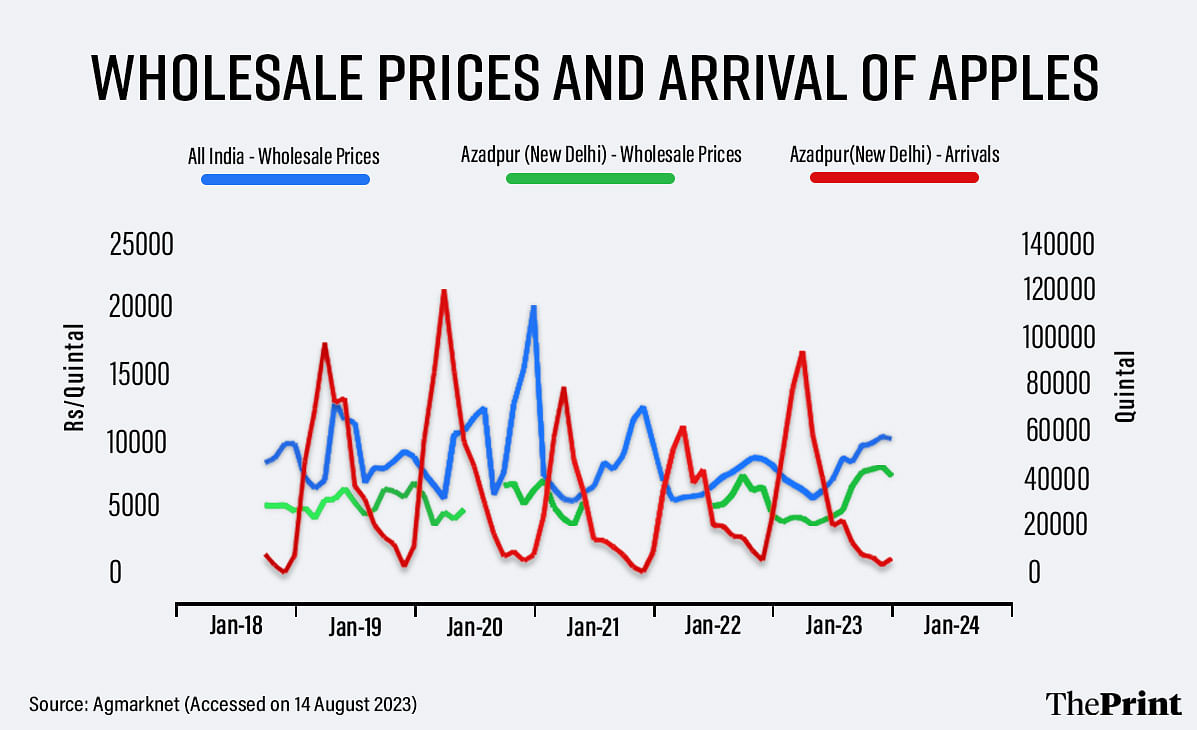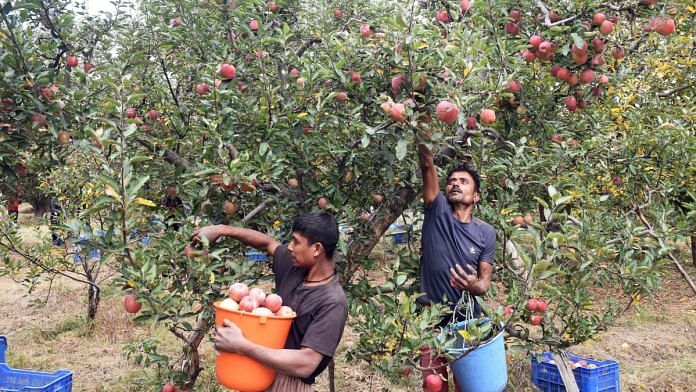As the reports of massive destruction to roads, houses and other infrastructure in Himachal Pradesh hog headlines, inclement weather has also caused enormous damage to the apple economy of the state. Production of apples may well be less than 50 per cent of the normal yield.
India’s apple production for 2022-23 is estimated at approximately 24 lakh tonnes. Jammu and Kashmir continues to be the dominant producer of apple, accounting for about 75 per cent of domestic yield (17 lakh tonnes), while 20 per cent comes from Himachal Pradesh (6 lakh tonnes). Both these states have Red Delicious, Royal Delicious, and Rich Red apple orchards that are 30-35 years old.
Over the years, the production of apples is falling in both Himachal Pradesh and Jammu and Kashmir. The area under apple cultivation has increased but the yield has declined in the last one decade. The highest productivity of about 10 metric tonnes per hectare was recorded in 2010-11.
This year, according to media reports and our conversations with apple growers, the production in Himachal Pradesh may be much lower due to poor snowfall in winters and excessive rains from April onwards, which have continued till August. Sunlight did not reach the root zone of plants in most areas due to which the size of apples is smaller. The apple growers also mention that the pesticides have been quite ineffective this year in controlling fall of leaves.
Also read: Apple farmers unite, protest against Centre’s farming policies
Cold chain for apples
The Ministry of Food Processing Industries (MoFPI) has been running a scheme since 2008 for assisting creation of a modern cold chain facility, which increases the shelf life of apples and enables its availability in lean months. A subsidy of up to Rs 10 crore is sanctioned to eligible projects. As of January 2023, MoFPI has sanctioned 17 cold chain projects in Himachal Pradesh, of which 16 are for fruits and vegetables and one for dairy. The total investment in these projects is Rs 536.4 crore and the amount of subsidy sanctioned by the government is Rs 149.28 crore.
In Himachal Pradesh, Adani Agri Fresh Limited (AAFL) is one of the major buyers of apples as it has set up a 22,400 tonne of controlled atmospheric warehousing facility in Shimla district. As a major organised player in apple trade in Himachal Pradesh, AAFL’s set price for procuring apples from farmers influences the open market. In 2020, they had bought apples at Rs 88 per kg but in August 2021, AAFL announced that it will procure best quality apples at Rs 72 per kg. Even in 2022, the farmers were offered only Rs 76 per kg.
The low price offered by Controlled Atmosphere (CA) stores resulted in apple growers’ agitation in 2021 and 2022.
Before the entry of organised players and establishment of cold chain projects, the apple trade was disorganised and the farmers sold their produce to commission agents, mostly of Azadpur mandi of Delhi. The establishment of CA stores has provided the apple growers a ready market for their apples and their dependence on traders of Azadpur and other mandis has gone down. However, there are reports of delay in payment by CA stores.
This year, no CA store has so far announced the rate for procuring apples. It is feared that their capacity utilisation for this year might not even reach 40 per cent due to decreased production.
In Himachal Pradesh, there is no system of large-scale procurement of apples by the government. Small farmers get some support from the state government as the Himachal Pradesh Marketing Corporation (HPMC) procures C grade apples, which are used for making juice and jams. In 2021, this category of apples was procured at just Rs 9.50 per kg. In 2022, the rate was hiked to Rs 10.50 per kg. For this year, the rate is Rs 11 per kg.
This procurement is done under the Market Intervention Scheme (MIS), a centrally sponsored scheme by the Ministry of Agriculture and Farmers’ Welfare. The budget allocation was cut from Rs 1,500 crore in 2022-23 to a token amount of Rs 1 lakh in 2023-24. Any losses in the operation are shared by the Union and the state government in the ratio of 50:50. It is not known whether the state government will continue the scheme this year as it will have to bear entire losses. Due to poor crop, the procurement of C grade apples may be much lower. Since the allocation of funds in the Union Budget is just Rs one lakh, the Centre may not be able to share the losses.
Price outlook for 2023-24
The graph below shows wholesale prices of apples at All India average prices and the prices at Azadpur Mandi, Delhi. The wholesale prices of apples stood at Rs 74 per kilogram (kg) in July 2023 in Azadpur whereas it was Rs 102 per kg at all-India level.

Source: Agmarknet (Accessed on 14 August 2023)
It must be pointed out that for data on arrival and prices of major crops, Agmarknet is the most trusted site. However, the wholesale prices of apples in Azadpur mandi are not available for 2021, except for the month of May. Ironically, the arrivals in Azadpur are available on the portal. For informed policymaking, accurate and timely data is necessary.
Wholesale prices are the prices at which farmers sell their produce in mandis. It is not called arrival prices. Arrival denotes the quantity which arrives in the market.
Apples are selling for about Rs 150-175 per kg in Delhi. If the price around peak arrivals is so high, we can expect the prices to spike during the course of this year.
Also read: Apple production to face crunch after rains wipe out about $122 mn worth of fruit, say officials
Higher imports
At the end of Uruguay Round, India committed to a bound rate of duty (maximum import which India can levy) at 55 per cent. As a part of renegotiation for raising the bound rate of duty on wheat and rice among other items, India had to offer reciprocal concessions. Thus, India agreed to a bound rate of 50 per cent on imported apples. Bound rate is the maximum rate of duty (tariff) that can be imposed by the importing country on an imported commodity. Here, each country commits itself to a ceiling on customs duties (tariff) on a certain number of products.
The result is that imports have been rising in India. In 2022-23, 3.73 lakh tonnes of apples were imported from Turkey, Italy, Chile, Iran and New Zealand. This year, the US will also join the list of exporters for India as the additional 20 per cent duty imposed in 2019 has been removed. This was imposed in response to the US’ measure to raise tariffs on certain steel and aluminium products.
Apple growers from both Himachal Pradesh and Jammu and Kashmir have been complaining about high imports causing low price realisation. But this year is an exception due to lower production. So, import of apples may be even higher than previous years.
The rich can continue to enjoy their Washington apples but the poor will have to look for other fruits.
Siraj Hussain is a former Union agriculture secretary. Kriti Khurana is a PhD
scholar of economics at BITS Pilani, Hyderabad. Views are personal.
(Edited by Ratan Priya)



